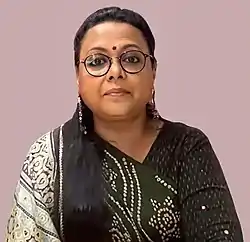Lopamudra Mitra | |
|---|---|
 Lopamudra Mitra | |
| Background information | |
| Origin | Kolkata, West Bengal, India |
| Genres | Jeebonmukhi, Aadhunik Bangla Gaan, Rabindra Sangeet, |
| Occupation(s) | Singer |
| Years active | 1996–present |
| Website | www |
| Spouse | |
Lopamudra Mitra is an Indian Bengali-language singer who started the trend of singing " Kobitar Gaan" or music set to poems. She is a doyen in this genre. Her most notable Kobitar Gaan, or poem set to tune, is Benimadhob by Joy Goswami. She is a popular singer in other genres like Folk, Modern Bengali Songs, and Rabindra sangeet.
Early life
Mitra was born in Kolkata, India. She was born into a musical and cultured middle-class family. Mitra studied from Basanti Devi College, Kolkata a University of Calcutta affiliated college. She is married to Music Director Joy Sarkar.
Discography
Modern Songs Albums
- Annya Hawa (1996)
- Annya Hawar Annya Gaan (1999)
- Sankota Dulcchey (1999)
- Bhalobashtey Bolo (2000)
- Dakchey Akash (2001)
- Kobita Theke Gaan (2002)
- Ei Abelay (2003)
- E Ghar Tokhon (2003)
- Pran Khola Gaan (2003)
- Jhor Hote Pari (2004)
- Ek Tukro Road (2005)
- Emono Hoy (2006)
- Chhata Dhoro[1] (2007)
- Po e Pora Fo e Fail (2008)
- Gaalfuluni Khukumoni (2009)
- Monfokira (2011)
- Vande Mataram (2014)
Tagore songs
- Bisshmoye (Tagore songs)(2004)
- Kotha Seshe (Tagore songs)
- O mor Dorodiya (Tagore songs)
- Mone Rekho (Tagore songs, 2006)[2]
- Ananda - The Ecstasy (Music arrangement by Joy Sarkar and Durbadal Chatterjee, 2009)
- Khoma Koro Prabhu (2015)
Basic albums (Collaborative)
- Notun Ganer Nouka Bawa (1997) (with Kabir Suman)
- Bhitor Ghorey Bristi (1998) (with Kabir Suman)
- Ganbela (2004) (with Srikanto Acharya)
- Surer Doshor (with Srikanto Acharya)
- Shapmochan (Tagore dance drama – with Srikanto Acharya and others)
Mixed
- Choto Boro Miley (1996) (Suman, Nachiketa, Anjan, Lopamudra and Indrani Sen)
Awards
She won many awards for her unique dramatic style of singing, which is fashioned with the classical aid and tenor voice quality.[3]
- Gold Disc Award by HMV in Completion of 10th year of her music life.
- Bengal Film Journalists' Association - Best Female Playback Award for Sedin Chaitramash.
- Best Singer & Best Album of the year, 2001, from Anandabazar Patrika for Bhalobaste Balo.
- Best Singer, Star Jalsa Award, 2011.
References
- ↑ Chakraborty, Saionee (2 October 2007). "Root route". The Telegraph. Calcutta, India. Archived from the original on 26 May 2011.
- ↑ "Music review Mone Rekho". The Telegraph (Calcutta). Calcutta, India. 4 August 2006. Archived from the original on 25 August 2006. Retrieved 10 October 2012.
- ↑ "Lopamudra Mitra Website". Archived from the original on 13 July 2011. Retrieved 5 October 2011.
External links